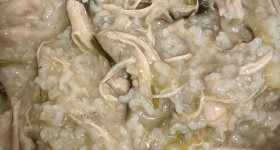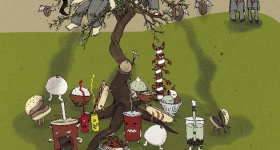“I’m excited to tell you that you can go to Beverly Hills High School!” Mr. Greene said with a broad smile on his pale round and pinkish face. He handed me a packet of papers. I looked down at the official high school application in my hand, then to my friends Terence, Victor, and Helene standing beside me.
“Beverly Hills High wants to increase their minority quota and would love to have more Chinese American students as part of their student body,” he continued, “even though you all don’t live in the district.”
I didn’t want to go.
I wanted to be with the friends I had made since elementary school. I wanted to go to the L.A. high school in our neighborhood where shooting scares were reported in the local news every few months. I wanted to do anything that would save me from the depression I was falling into, because my parents would not stop arguing with each other and then taking it out on me. They would not stop trying to get me to navigate their assimilation into America, or angrily resented me for doing so.
“Who you do you think you are?!” they demanded.
I sat alone in front of my new locker, watching streams of teens smiling through the hallways of Beverly with its oil rig on its property. I envied the Prada bags and Gucci purses on the shoulders of Persian girls who happily climbed into Range Rovers when the school day was over while I stood at the corner, waiting for the bus.
Over and over, my parents would tell us, “Fit in with the white kids.” They were afraid we wouldn’t make it in this new world. But every time I tried to dye my hair to become the kind of blonde on the white girls I envied, it turned orange.
My mother and father emigrated from Taiwan shortly before I was born and mismanaged one business after another, becoming increasingly indebted. Going to Beverly was a barometer of a lifestyle we could have had, had my father stayed at his former job rather than trying to make it on his own.
They sold cheesesteak sandwiches in West L.A. and yelled at my three younger siblings and I to do well in school. On Saturdays, my mother taught Chinese school, which was reminiscent of her career in Taiwan, and coached Mandarin speech competitions that became mandatory for me to participate in. We rehearsed in the front dining area of our hoagie shop, the glass windows revealing two lines of students, moving their arms and mouths in unison.
They then started an aquarium store on the eastside in Rowland Heights and berated us for not speaking better Mandarin like the Chinese kids they would see obediently following their parents, even though they purposely chose not to live in this community, because they did not want us to only be around Chinese people.
The fear of not having enough filled our bowls of rice during the family-style meals we shared. Rather than saying they cared, they asked, “Have you eaten?” and forced us to finish every last fleck.
When I discovered I could legally work at 15 1/2 years old, I found two jobs throughout my junior and senior years of high school to pay for my own college applications, SAT prep course, and occasional teriyaki chicken meals at the mall food court with friends.
But, to deal with the increasing chaos at home, I began to eat less. I packed my lunch bag with a slice of bread and an apple for the entire day, while I filled my younger siblings’ lunches to the point the brim would no longer fold over.
One Saturday, a Chinese school teacher pulled me aside after I jogged there rather than driving with my mother.
“Ni zhenme gao de?” What’s wrong with you? She wanted to know.
I shrugged my shoulders. “She me? Mei shi.” What? Nothing’s wrong.
“You’re getting too thin,” she told me. “Something’s wrong.”
She was the only person to recognize I had a problem before I did. Not my parents, but a virtual stranger.
On the night of prom, I binged for the first time. My 5’6” frame could no longer sustain the smaller than size 0 I had become. I ate to the point I actually passed out. Woke up, did it again. Woke up, did it once more. My body had no idea what was happening and my mind was freaking out.
I’m going to gain weight, I worried. I was going to lose what little semblance of control I had in my life. I needed to find another way to stay small.
One afternoon, after I had already gotten my acceptance letter into UC Berkeley, I was secretly watching television when my parents weren’t home, and came across an after-school special. In it, two Caucasian girls were bingeing and purging to stay thin. I had never heard of this before.
You can throw up and not get fat? I marveled. It didn’t matter to me that one of the characters dies from heart failure to warn viewers against bulimia. I had found my miracle cure. I could eat everything I wanted and still lose weight.
Over the next 10 years, I would binge and purge my way out of my own existence, running from Southern California to Northern California to England to South Carolina to Shanghai, until finally, my body began to fall apart. My heart began to palpitate like that girl I watched on television so many years before. I stopped getting my period. My entire body was swollen from the abuse of food addiction I kept putting myself through.
In Shanghai, I realized I had been lying to myself that my family was cruel to me, because it was cultural. I convinced myself that being hit on my palms with a rolling pin or being called a ‘slut’ because I wanted to wear a tank top to school was just what Chinese parents did.
But in China, I saw these people who looked like my family members holding hands, showing affection, sharing love.
So, it’s just my own family that’s fucked up.
I returned to California and entered into an intensive outpatient program for my eating disorder. As a good student, I did my own homework. I went to 12-Step Eating Disorders Anonymous meetings. I discovered yoga. I sought spirituality through meditation classes to quiet my mind. Throughout it all, I was always the only Asian person in the room.
“You go to therapy?” a Chinese friend once asked me. “I wish I could go.”
“But, you can,” I said. They didn’t.
Why was I the only Asian person publicly getting help for things my friends told me they suffered from, too? Was it because we had all been taught to save face? When I told my mother I was in therapy, she was watching TV in bed.
“Okay,” she nodded. My father promptly fell asleep.
I could finally see that wanting their validation or wishing they would finally change so I could be happy was hopeless. All I could do was work on me.I set out to find what makes me thrive. I kept pursuing my writing and my life, vulnerably. I packed up my bags and moved to Kauai in Hawaii, because that was my dream of all dreams. It’s where I met my husband and where I chose to become pregnant before we got married. Now, our new little family is driving around the country in a camper van seeking new adventures.
Because I was no longer showing up in the same ways, our family dynamic had to shift. And it did — for the better. At 35, I told my parents about the book I’m writing about our lives together. The destruction, my bulimia, my healing.
“It’s going to expose a lot about you guys,” I warned over dinner in the same space where so much of our drama began.
“That’s okay,” they said in agreement. “If it helps one person, it’s worth it. We’ve all changed.”
Maybe I won’t be the only Asian person having honest dialogues and showing up in brave and uncomfortable ways after all. My parents are here with me, too. We’re each learning how to braid the cultures we were born into and the one we’ve grown up in. In our own ways, we’re making it work.










Comments